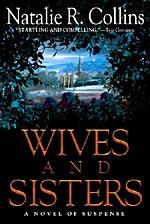Novel portrays world similar to Mark Hacking case
By Jody Ewing
October 14, 2004

On Oct, 1, Salt Lake City police confirmed that the body they’d found in a landfill was that of Lori Hacking, the 27-year-old pregnant woman reported missing by her husband Mark on July 19. Up until Lori’s disappearance, Mark, 28, had spun a web of lies that included graduating from the University of Utah and his acceptance to medical school at University of North Carolina. Neither proved true, and the former psychiatric hospital orderly now has been charged with Lori’s murder.
Well before the Hacking case made national headlines, author and journalist Natalie R. Collins penned a novel familiar to many young men and women raised inside the strictures of Utah’s fundamentalist Mormon community.
“Wives and Sisters,” published this week by St. Martin’s Press, depicts a world eerily similar to that of Mark Hacking. The parallels between the deceptions Hacking built around his education and the lies perpetrated by Collins’ character “Mark Peterson” are remarkably uncanny, right down to the same first name.
As a former member of the Church of Jesus Christ of Latter-day Saints and a lifelong Utah resident, Collins paints an authentic, disturbing portrait of a vast organization’s violent and colorful past.
 Natalie Collins |
Sheltering system enables offenders
Collins’ novel opens with an ominous first line that sets the stage for her dramatic tale: “I was six years old the first time I had an inkling God would not always protect me.”
It moves quickly to a shallow creek where 6-year-old Allison Jensen plays with her best friend, Cindy. One moment Cindy is there; the next a bearded man holds them both at gunpoint and suddenly Cindy is gone. When no leads emerge, Cindy is given up for dead. Several years later, still haunted by her childhood friend’s disappearance, Allison suffers a brutal attack that forces her to fill in the gaps of a patchwork memory.
Determined to bring her attacker to justice, she finds herself on a collision course with powerful community leaders bent on covering the tracks of a sexual predator. She must uncover the truth before they find her first and keep her from piecing together the tragic past that haunts her life.
“Writing this book was very cathartic for me,” said Collins in an interview from her Utah home. “I had told my parents that I was going to write my memoirs. They were deadset against it, for reasons I never quite understood.”
Collins decided to “fictionalize” her story, though she says it represents many events throughout her life. Like the character Allison, Collins shared a sinister experience at age six, which she says inspired the novel’s opening.
“I was held at gunpoint with my sister when we were very young children,” she says. “Although the perpetrator was apprehended, charges were never filed because pressure was put onto my parents not to do so.”
In her extensive research of the history and teaching of Mormonism, Collins – who worked 11 years for The Salt Lake Tribune – found amongst its leaders a “protect the Church at all costs” mentality, an ideal she says leads to a sheltering system that enables offenders to abuse their victims repeatedly and without consequence.
That sheltering system reared its head once again months before “Wives” was published. The Latter-day Saints (LDS) hierarchy asked St. Martin’s Press for advance copies long before they should have known it existed. There was no catalog, no listing of the book, no promotion of any kind. There was, however, Collins’ website and her prominence in the ex-Mormon community. She also belongs to an ex-Mormon mailing list, whose members have long suspected that the LDS Church monitors the list. Collins finds their watchful eye “a little bit creepy,” but adds it isn’t surprising.
Her first novel “SisterWife” focused on a central Utah polygamous cult and the lengths to which they’d go to bring about a prophecy, though she says her purpose has never been to say, “The Mormon religion is bad.” Rather, she believes that Mormons are “living, breathing, human beings who love their neighbors, shoot their neighbors, sleep with their neighbors, and sometimes even marry their neighbor’s daughters – all four of them.”
‘They’ve been lied to all their lives’
As a young LDS woman, Collins remembers being hit with the fact that she was not responsible for her own salvation; according to church doctrine, she could not get into heaven without first marrying a man.
“Mormon women are given two roles: they are wives and sisters,” she says. “While Mormon men can be elders, brothers, bishops or presidents, the women – no matter what calling they hold – are called ‘Sister.'” The ultimate goal is entering the “Celestial Kingdom,” where the men become gods, heading up their own little kingdoms and populating them with wives and spirit children.
Collins’ parents forbid her to explore other religions, and at age 18 she left home and the church, moving to Salt Lake City to attend the University of Utah.
“The fundamentalist Mormons are living the LDS Church the way [founder] Joseph Smith Jr. taught it,” Collins says. “They believe the mainstream church to be the apostates. The fundamentalists, however, have evolved into horribly abusive communities where young girls are basically sold as chattel, and young boys are thrown out so they won’t compete with the old men who need more wives.”
Collins laments the fact that so many Mormon women do not see this, nor understand their own strength, their own importance or their own ability to stand on their own merits and be recognized for what they do.
“It’s not hard to brainwash a Mormon woman. You are told over and over again what your role is,” Collins says. “‘There is where you fit.'”
What the church views as “absolute truth,” is something Collins compares to “The Wizard of Oz” in the scene where Toto the dog pulls aside the curtain, revealing the Wizard’s true identity while an authoritarian voice booms “Pay no attention to the man behind the curtain.”
“Ex-Mormons aren’t listening anymore,” Collins says. “They can finally see the man in the box, and they’re mad as hell that they listened all those years. They’ve been lied to all their lives.”
Hacking merely tip of iceberg
Collins says that a closed, patriarchal society abuses not just its women but also its men, who many times cannot meet the “very high ideals”: They have to go on a mission. They have to come home and get married. They have to go to school and make a lot of money to support all the children they have to have.
“Not everyone can live up to this. The ‘Mark Hackings’ and [character] ‘Mark Petersons’ of Utah are very, very numerous,” Collins says. “There really is very little ‘give’ for Mormon men in the LDS society. The pressure to take your family to the Celestial Kingdom is intense, and there is a very real pressure to make the most money and be the best businessman in the LDS Church.”
The penchant to “protect the Church at all costs” also means dealing with punishment within the Church system. The result is offenders not always brought to justice, and pressure upon church members not to pursue litigation or even criminal charges against other church members who may be “trying to turn their lives around.”
When a case makes national news, however, the LDS hierarchy is quick to wash its hands and downplay the perpetrator’s involvement with the Church.
“Mark Hacking’s being Mormon will be nothing more than a sidebar, everyone will ignore it, and it will go quietly away as he is put down as nothing more than another abusive husband. This, of course, makes me angry,” Collins says. “There is a reason this happened. He could not live up to the requirements and bonds of patriarchy. If you fail – well, there will be no failing. The disappointment of friends, family members, loved ones is enormous. Almost more than one can bear.”
While Collins believes Mark Hacking should be punished to the fullest extent of the law, she says she understands “the society that created Mark Hacking, and the Mark Hackings before him.”
Through “Wives and Sisters” and its empowered protagonist, Collins hopes to encourage both men and women to question what is offered up as “absolute truth” and be strong-willed enough to find their own middle road.
“You realize that you could have been there all along,” she says. “And it’s a good feeling.”
For more information visit www.nataliercollins.com
Other resources:
www.HelpTheChildBrides.com
Leave a Reply